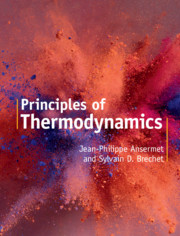1 - Thermodynamic System and First Law
from Part I - Foundations
Published online by Cambridge University Press: 14 December 2018
Summary
The definition of a thermodynamic system includes the characterisation of its enclosure. The system can be closed or open, adiabatic or diathermal, rigid or mobile. State variables may be extensive or intensive. State functions are functions of the state variables only. A system may be divided into subsystems separated by walls that can be impermeable or permeable, adiabatic or diathermal, fixed or mobile. The state of a system may be changed by mechanical processes or thermal processes, resulting in a thermal transfer, mass transfer or work. The first law is expressed in terms of the total energy that includes the kinetic energy, so that thermomechanical systems can be analysed, creating a conceptual link between classical mechanics and thermodynamics. By examining a damped harmonic oscillator in the framework of thermodynamics, the need for a non-mechanical state variable is revealed.
Keywords
- Type
- Chapter
- Information
- Principles of Thermodynamics , pp. 3 - 25Publisher: Cambridge University PressPrint publication year: 2019

